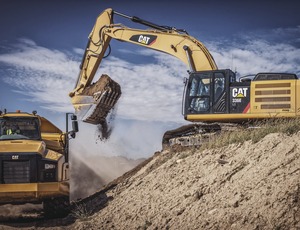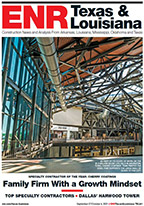

If you think that the latest round of off-road clean-diesel mandates, or Tier 4, will kill off the engine that powers the majority of construction equipment, think again. A new guard of sophisticated, clean-burning, electronic engines are rendering extinct the prehistoric, smoke-belching, mechanical diesels of yesteryear. Cleaner power costs more up front, but it promises more long-term returns.
The diesel's transition from mechanical to electronic operation bears some resemblance to a period that automotive enthusiasts call the "Malaise Era," a difficult decade of performance and reliability problems when new emission and fuel regulations began crippling gasoline engines in the 1970s. It took engineers years to work out the bugs.
"We're halfway through this transition," said Andy Agoos, a fleet management consultant who spoke at a roundtable discussion that ENR moderated Oct. 24 at a Ritchie Bros. auction site in Davenport, Fla. "At the end of this thing, it is going to be wonderful, but right now, it feels like a train wreck."
Diesels began a path of heavy regulation in the last decade that will continue through 2015. Equipment users must learn a new alphabet soup of technologies such as diesel particulate filters (DPFs), selective catalytic reduction (SCR) and diesel exhaust fluid (DEF). However, the advance of computer controls enables the engines to move into the digital age.
"You can remotely monitor them," says Joe Mastanduno, marketing manager at Deere & Co. "It is not just about getting cleaner air." Further, construction may wind up bypassing its own malaise era, experts say, because of previous lessons already learned in the on-road vehicle sector. "We expect to see the reliability and low maintenance that we have come to expect on cars after just a few years of transition," explains Brad Allen, vice president of engineering at Genie Industries.
The up-front costs will not be cheap, though, and resale values are at risk. Machines rated for Tier 4 will cost up to 25% more than Tier 3 models by 2015, notes Frank Manfredi, an equipment analyst in Mundelein, Ill. "The used-equipment value of those Tier 3 machines has gone up by about 35%," he says, adding that rental companies were "buying up as many Tier 3 machines as they could put their hands on."
Another issue is the question of selling used Tier-4 equipment to unregulated markets such as Latin America, where clean diesel fuel is not readily available. Curt Hinkelman, senior vice president at Ritchie Bros., counters that the market will adjust: "Low sulfur diesel will start to find its way there," he says. Manufacturers add that they are working on kits for overseas technicians to "de-tier" the machines so they can operate in countries that are slower to adapt.



Post a comment to this article
Report Abusive Comment